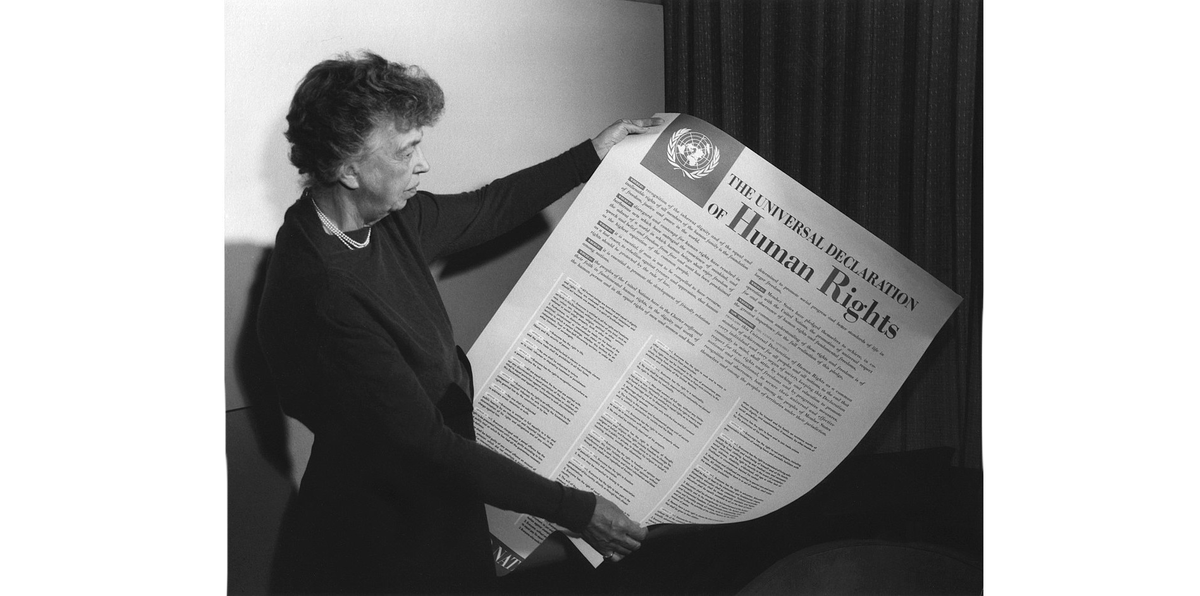You Have No Power Here! The Waning Impact of Human Rights as a Political Tool

Share
In 1948, the member states of the recently formed United Nations adopted a resolution with a singular purpose: to demonstrate their commitment to human rights and distance themselves from the failures that led to the devastation of the second world war. Resolution 217A, better known as the Universal Declaration of Human Rights (UDHR), codified these principles in a joint declaration by all the members of the United Nations at the time.
The Declaration sought to establish a baseline of human rights principles that would form the seed for the framework of protection of human rights in the future. Since then, conventions, treaties, agreements and declarations have populated the international arena. Some documents are binding, others less so, but all revolve around the principle of respect for the dignity and safety of humans, whoever and wherever they may be.
The collection of documents and declarations that sprouted as a result, combined with oversight agencies and specialized committees bridging the gap between states would, theoretically indicate that the topic of human rights is one that all are in agreement about. Yet, a quick glance at realities on the ground around the world would belie this notion. Instead of a set of cherished principles representing common global values, human rights appear to have taken a rather different role than was envisioned.
Wielding Human Rights

If one were to observe engagements between states as they level mutual accusations of violations of human rights, even as they themselves transgress, it would not be wrong to assume that either there is a breakout of cognitive dissonance among states, or that human rights law is no more than a political tool in the hands of governments.
Reality would indicate that it is the latter. Governments around the world have appropriated human rights as a tool in their engagement on the international arena. Through expressing 'concern' about the state of human rights in other countries, and urging reform, pointing out patterns of violations, they seem to be able to pressure other states into desired policy paths.
Governments have increasingly used human rights as leverage in negotiations, with donor states using them as conditions attached to development programs, as a way to embarrass rivals on the international stage, or even as a pretext for intervention into countries' affairs.
This tool is used to greater effect by some countries compared to others, largely the Global North. In engagements with countries from the Global South, this thorny issue has been the source of unending frustration for the latter. Through a series of regularly issued reports, data collection and active pursuit in intergovernmental forums, many countries from the have found themselves defending against repeated accusations of human rights violations, often at a disadvantageous position.
However, the frustration did not stem from the fact that the violations were real (which they often are), but rather from the fact that their strategies in defending against this approach were often ineffective. Reliance on the true and tested approach of 'whataboutisms' did not work effectively; when defending against governments that in their own countries protect the rights of their citizens, that approach falls flat.
Recent developments however have complicated the dynamics of intergovernmental human rights advocacy. The parallel conflicts of Gaza and Ukraine shined a spotlight on the double standards employed by some when it comes to human rights. While there was little doubt among governments that human rights were simply being wielded as a tool when convenient, it was often difficult to argue the point effectively.
Through their positions on Israel’s war on Gaza, however, several governments that have traditionally branded themselves as champions of human rights found themselves at a crossroads. On the one hand they could prioritize their adherence to the principles of human rights and the rule of law, and on the other they could let their strategic interests take precedence.
Those opting to prioritize their strategic interests over their adherence to promoting the protection of human rights, in alignment with the realist approach to international relations, opened a door to credible criticism of their policies. When engaging other governments on issues of human rights, responses often revolve around the point of 'you have yet to condemn the most egregious sustained violation of human rights in this century, you have no standing to criticize our human rights record.' In simpler terms, whataboutism has reared its head in the form of "what about Gaza?"
The Spirit and the Letter

Before we venture into how Israel’s war on Gaza has potentially weakened the positions of numerous governments in their engagement on human rights with other countries, it is important to establish a few points. First and foremost, let us immediately disavow ourselves of the notion that any government in history has ever cared about human rights as a matter of principle.
When governments express their concerns about the state of human rights, they are not doing so from the same perspective that an individual would do so; unlike individuals, who may be driven by personal empathy, governments operate as entities with a different set of priorities and perspectives, including the protection of national interests.
This is true whether the government is a liberal democracy or a tyrannical autocracy; they do not ‘care’ in the same way that an individual does because they do not have the ability to do so. They particularly do not care about anyone outside their own jurisdiction. While the individuals that make up a government may care, the institution that is the government, the collection of organizations, agencies, and individuals that collectively form the collective consciousness does not.
Having said that, there is a spectrum of implementation when it comes to human rights on national levels; some governments, through their legislative and institutional processes adhere to the protections of human rights with in their jurisdictions more than others. Through systems of checks and balances, accountability, and the rule of law, the protection of human rights becomes a policy integrated into the behavioral norms of government institutions.
On the other end of the spectrum, there are governments that pay lip service to human rights, while actively avoiding their inclusion in their institutional norms because they view them as limiting their capacity to impose their method of governance. Most lie somewhere between the two ends of this spectrum.
None of these governments care about the rights themselves, and approach other issues in much the same way. The former -those with greater rule of law- is concerned with adherence to process, and will have that same concern with processes connected to other issues as well, while the latter will be more likely to disregard other regulations that they find inconvenient whether in the field of human rights or elsewhere.
You Have no Power Here!
Several governments have, to varying degrees, lost leverage when wielding human rights as a tool against others, as a result of their reluctance to criticize Israel’s violations during the ongoing onslaught in Gaza. Three in particular- the United States, the United Kingdom, and Germany- stand out, not only because they tend to be vocal in criticizing violations of human rights in other countries, but also because of their concurrent reluctance to do so with when it concerned a country with mutual interests.
This dissonance illustrates the issue we referred to earlier, that governmental concern for human rights -especially in other countries- is rarely motivated by absolute ethical or moral drivers. When the geostrategic interests of a government conflict with its adherence to human rights norms, the former always and almost without fail comes out on top.
If we take as an example the three countries mentioned above, they each have specific interests tied to Israel, interspersed between geopolitical and historical, that preclude them from taking any significant stances against it regardless of the extent of violations it commits. That will remain true right up to the moment when it is convenient to do so, whereupon these governments, as others have done, will shift their tone.
What resulted is a defanging of this particular tool. Human rights accusations from countries that have publicly, repeatedly, and unashamedly, been supportive of egregious violations of human rights (or have failed to condemn them) carry little weight.
Picture yourself as a representative of a country with recurring issues relating to freedom of press. It is July 2023, and your government has recently imprisoned several journalists, and you have extensive cooperation with the US on various issues. You sit opposite a US delegation that has requested this meeting to discuss issues relating to freedom of the press. You know that they will leverage this to get better terms, and elicit concessions on existing cooperation, and you have prepared a set of talking points but they feel flimsy. Hoping for the best, you know that this will be a difficult meeting, and expect little in terms of positive outcomes.
Fast forward to July 2024, a request for the same meeting comes in; the US delegation is expressing interest in discussing freedom of the press, and the necessity of protecting journalists in your country. This time however, things are different. Before the meeting, you introduce the issue of the 100+ journalists killed by Israel in its war on Gaza to the agenda, refusing to discuss anything related to freedom of the press without addressing that issue first.
After all, your government merely imprisoned a few journalists, it did not kill more than 100 in the span of a few months. In the meeting, every time the importance of protecting a free press is raised, you wield the “what about” card. “What about the 100 journalists killed?” you ask the US delegation. “What is your position on them? What actions have you taken? Why are you talking to us about a few imprisoned journalists when over a hundred have been killed and you have done nothing?" The impact of the criticism and its weight is reduced and not credible.
So What?
As these double standards become more apparent, they threaten not only to normalize human rights violations but also to undermine the foundational principles of international human rights law. When powerful states selectively enforce human rights norms, it sends a message that these principles are malleable, contingent upon political alliances and strategic interests.
This inconsistency erodes the legitimacy of global advocacy efforts, making it easier for states to dismiss criticism as politically motivated rather than a genuine concern for human rights, regardless of its source. Over time, this normalization of selective enforcement could create a permissive environment where violations are increasingly tolerated, especially by those who align themselves with powerful backers or who can invoke similar double standards.
The potential repercussions on the long term are far-reaching. Where there is a precedent for overlooking or excusing certain violations, these behaviors are likely to recur, setting a dangerous standard that weakens the global human rights infrastructure. Unaddressed violations in one context will likely embolden other states to commit similar acts, knowing that accountability is uneven and, at times, entirely absent. This creates a ripple effect, where the erosion of norms in one area can lead to broader systemic failures, making it progressively harder to uphold human rights standards internationally, or hold violators to account.
This combination of elements signals a potential paradigm shift in international human rights law. If this trend continues unchecked, the international community risks witnessing a rollback of decades of progress in human rights protections. Unless these issues are addressed, the already fragile global human rights system could foreseeably morph into an even more ineffectual set of principles to which many aspire, but few uphold.



